-
 Bitcoin
Bitcoin $84,258.9872
0.35% -
 Ethereum
Ethereum $1,590.5943
1.14% -
 Tether USDt
Tether USDt $0.9998
-0.02% -
 XRP
XRP $2.0990
1.26% -
 BNB
BNB $587.2456
1.30% -
 Solana
Solana $132.5296
6.11% -
 USDC
USDC $0.9999
0.00% -
 TRON
TRON $0.2483
-2.37% -
 Dogecoin
Dogecoin $0.1557
1.96% -
 Cardano
Cardano $0.6199
2.68% -
 UNUS SED LEO
UNUS SED LEO $9.1185
-2.93% -
 Chainlink
Chainlink $12.4572
2.80% -
 Avalanche
Avalanche $19.2046
1.97% -
 Toncoin
Toncoin $2.9568
3.52% -
 Stellar
Stellar $0.2397
2.14% -
 Shiba Inu
Shiba Inu $0.0...01181
1.81% -
 Sui
Sui $2.0961
0.90% -
 Hedera
Hedera $0.1602
2.15% -
 Bitcoin Cash
Bitcoin Cash $330.4313
4.06% -
 Polkadot
Polkadot $3.6278
3.32% -
 Litecoin
Litecoin $74.9638
1.65% -
 Hyperliquid
Hyperliquid $16.4916
8.27% -
 Dai
Dai $0.9999
-0.01% -
 Bitget Token
Bitget Token $4.3499
0.87% -
 Ethena USDe
Ethena USDe $0.9990
-0.03% -
 Pi
Pi $0.6068
-1.04% -
 Monero
Monero $216.4766
0.12% -
 Uniswap
Uniswap $5.1795
0.94% -
 Pepe
Pepe $0.0...07203
1.55% -
 OKB
OKB $50.4898
-2.39%
What does blockchain mean and how can it change real estate transactions?
Blockchain in real estate can streamline transactions, enhance transparency, and reduce costs by tokenizing titles and using smart contracts, despite facing regulatory and scalability challenges.
Apr 07, 2025 at 10:01 pm
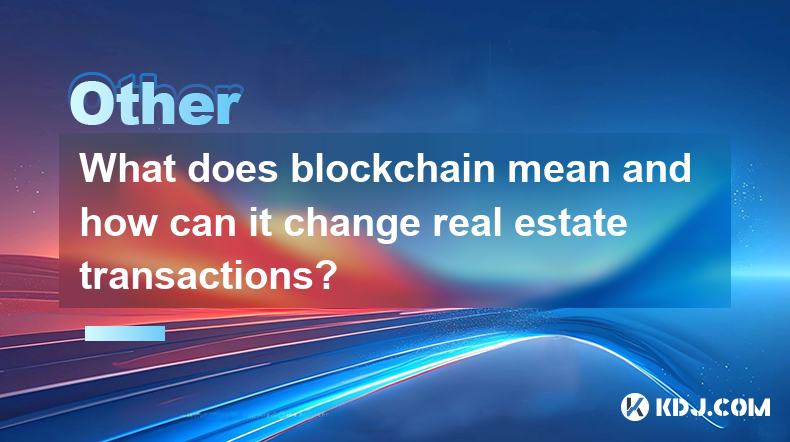
Blockchain technology, at its core, is a decentralized, distributed ledger that records transactions across numerous computers, ensuring that the recorded data is unchangeable and transparent. In the realm of cryptocurrencies, blockchain serves as the underlying technology that enables secure and direct transactions without the need for intermediaries like banks. The concept was first introduced with the launch of Bitcoin in 2009, and since then, it has evolved to support a variety of applications beyond just digital currencies.
Understanding Blockchain Technology
Blockchain functions by grouping transactions into blocks, which are then linked together in a chain. Each block contains a list of transactions, a timestamp, and a cryptographic hash of the previous block, creating a secure and immutable record. The decentralized nature of blockchain means that no single entity controls the entire network, reducing the risk of fraud and manipulation. In the cryptocurrency world, this technology underpins the operation of numerous digital assets, facilitating secure and transparent exchanges.
Applications of Blockchain in Real Estate
The integration of blockchain into real estate transactions can revolutionize the industry by enhancing efficiency, transparency, and security. Traditionally, real estate transactions involve numerous intermediaries, such as banks, lawyers, and title companies, which can lead to delays and increased costs. By leveraging blockchain, these transactions can be streamlined, reducing the need for intermediaries and speeding up the process.
Streamlining Property Transactions
One of the primary benefits of using blockchain in real estate is the ability to streamline property transactions. With blockchain, property titles can be tokenized and recorded on the blockchain, creating a clear and immutable record of ownership. This can significantly reduce the time and cost associated with transferring property titles. Additionally, smart contracts, which are self-executing contracts with the terms directly written into code, can automate various aspects of the transaction process, further enhancing efficiency.
Enhancing Transparency and Security
Blockchain can also enhance the transparency and security of real estate transactions. Since all transaction data is recorded on the blockchain, it is accessible to all parties involved, ensuring that everyone has a clear view of the transaction history. This transparency can help prevent fraud and disputes. Moreover, the cryptographic security of blockchain makes it extremely difficult to alter or falsify records, providing an additional layer of protection for property owners and buyers.
Reducing Costs and Increasing Accessibility
By eliminating the need for intermediaries, blockchain can significantly reduce the costs associated with real estate transactions. Traditional transactions often involve hefty fees for services like title searches, escrow, and legal representation. With blockchain, many of these services can be automated or eliminated, leading to cost savings for both buyers and sellers. Furthermore, blockchain can increase accessibility to real estate markets by enabling fractional ownership of properties, allowing more people to invest in real estate through tokenized assets.
Challenges and Considerations
Despite its potential benefits, the adoption of blockchain in real estate faces several challenges. Regulatory uncertainty is a significant hurdle, as governments and regulatory bodies are still grappling with how to oversee blockchain-based transactions. Additionally, the technology itself is still evolving, and there may be concerns about scalability and the technical expertise required to implement blockchain solutions. However, as the technology matures and regulatory frameworks become clearer, the potential for blockchain to transform real estate transactions remains significant.
Real-World Examples of Blockchain in Real Estate
Several companies and projects are already exploring the use of blockchain in real estate. For instance, Propy is a platform that uses blockchain to facilitate property transactions, allowing users to buy and sell properties using cryptocurrencies. Another example is Ubitquity, which offers blockchain-based title and escrow services, aiming to streamline the process of transferring property titles. These initiatives demonstrate the practical applications of blockchain in real estate and highlight the potential for widespread adoption in the future.
Future Prospects and Innovations
Looking ahead, the future of blockchain in real estate appears promising. As the technology continues to evolve, we can expect to see more innovative applications and solutions emerge. For example, the use of decentralized finance (DeFi) platforms could further enhance the accessibility and efficiency of real estate transactions. Additionally, the integration of blockchain with other emerging technologies, such as artificial intelligence and the Internet of Things (IoT), could lead to even more advanced and streamlined real estate processes.
Impact on Traditional Real Estate Practices
The adoption of blockchain in real estate could have a profound impact on traditional practices. For instance, the role of intermediaries like real estate agents and title companies may diminish as more transactions are conducted directly on the blockchain. This shift could lead to a more democratized real estate market, where buyers and sellers have greater control over their transactions. However, it also raises questions about the future of these traditional roles and how they might adapt to a blockchain-based environment.
Legal and Regulatory Considerations
As blockchain technology continues to be integrated into real estate, legal and regulatory considerations will play a crucial role. Governments and regulatory bodies will need to establish clear guidelines and frameworks to ensure that blockchain-based transactions are conducted safely and legally. This includes addressing issues such as property rights, taxation, and compliance with anti-money laundering (AML) and know-your-customer (KYC) regulations. As these frameworks evolve, they will shape the future of blockchain in real estate and determine its viability as a mainstream solution.
Technological Infrastructure and Adoption
The successful implementation of blockchain in real estate also depends on the development of robust technological infrastructure. This includes the creation of user-friendly platforms and applications that can be easily adopted by both industry professionals and consumers. Additionally, the scalability of blockchain networks will be crucial to handling the large volume of transactions that occur in the real estate market. As these technological challenges are addressed, the adoption of blockchain in real estate is likely to accelerate, paving the way for more efficient and secure transactions.
Educating Stakeholders and Building Trust
Educating stakeholders about the benefits and potential of blockchain in real estate is essential for its widespread adoption. This includes not only buyers and sellers but also real estate professionals, legal experts, and regulatory bodies. Building trust in the technology will be crucial, as many people may be hesitant to adopt a new and unfamiliar system. By providing clear information and demonstrating the advantages of blockchain, the industry can foster greater acceptance and integration of this transformative technology.
Case Studies and Success Stories
Examining case studies and success stories can provide valuable insights into the practical applications of blockchain in real estate. For example, the use of blockchain in a pilot project in Sweden demonstrated significant improvements in the efficiency of property transactions. Similarly, a project in Dubai aimed to transition all real estate transactions to the blockchain by 2020, showcasing the potential for large-scale adoption. These examples highlight the real-world impact of blockchain and serve as a testament to its potential to revolutionize the real estate industry.
Collaborative Efforts and Industry Partnerships
Collaborative efforts and industry partnerships will be key to advancing the use of blockchain in real estate. By working together, technology companies, real estate firms, and regulatory bodies can develop and implement blockchain solutions that meet the needs of the industry. These partnerships can also help address the challenges associated with adoption, such as regulatory compliance and technological infrastructure. As more stakeholders come together to explore the potential of blockchain, the likelihood of successful integration into real estate transactions increases.
Blockchain and the Future of Real Estate Investment
Blockchain technology has the potential to transform not only property transactions but also the broader landscape of real estate investment. By enabling fractional ownership through tokenized assets, blockchain can democratize access to real estate investments, allowing more people to participate in the market. This could lead to increased liquidity and diversification of investment portfolios. Additionally, the transparency and security provided by blockchain can enhance investor confidence, making real estate a more attractive investment option.
Environmental and Social Impact
The adoption of blockchain in real estate could also have significant environmental and social impacts. By streamlining transactions and reducing the need for paper-based processes, blockchain can contribute to more sustainable real estate practices. Additionally, the increased accessibility to real estate investments through tokenization could help address social inequalities by providing more people with opportunities to build wealth through property ownership. As the industry continues to explore the potential of blockchain, these broader impacts will become increasingly important considerations.
Common Questions and Answers
Q: What is blockchain technology?
A: Blockchain technology is a decentralized, distributed ledger that records transactions across numerous computers, ensuring that the recorded data is unchangeable and transparent. It was first introduced with Bitcoin and has since been used for various applications beyond cryptocurrencies.
Q: How can blockchain change real estate transactions?
A: Blockchain can change real estate transactions by streamlining the process, enhancing transparency and security, reducing costs, and increasing accessibility. It can tokenize property titles, automate transactions with smart contracts, and enable fractional ownership of properties.
Q: What are the challenges of adopting blockchain in real estate?
A: Challenges include regulatory uncertainty, the evolving nature of the technology, scalability concerns, and the need for technical expertise. Overcoming these challenges will be crucial for the successful integration of blockchain into real estate transactions.
Q: Are there real-world examples of blockchain in real estate?
A: Yes, companies like Propy and Ubitquity are using blockchain to facilitate property transactions and provide title and escrow services. Pilot projects in countries like Sweden and Dubai have also demonstrated the potential of blockchain in real estate.
Q: How can blockchain impact traditional real estate practices?
A: Blockchain could diminish the role of intermediaries like real estate agents and title companies, leading to a more democratized market. This shift may require traditional roles to adapt to a blockchain-based environment.
Q: What are the legal and regulatory considerations for blockchain in real estate?
A: Legal and regulatory considerations include establishing clear guidelines for property rights, taxation, and compliance with AML and KYC regulations. As these frameworks evolve, they will shape the future of blockchain in real estate.
Q: How can stakeholders be educated about blockchain in real estate?
A: Educating stakeholders involves providing clear information about the benefits and potential of blockchain, as well as demonstrating its advantages through case studies and success stories. Building trust in the technology is crucial for its widespread adoption.
Q: What role do collaborative efforts and industry partnerships play in blockchain adoption?
A: Collaborative efforts and industry partnerships are essential for developing and implementing blockchain solutions that meet the needs of the real estate industry. They can help address challenges such as regulatory compliance and technological infrastructure.
Q: How can blockchain impact real estate investment?
A: Blockchain can transform real estate investment by enabling fractional ownership through tokenized assets, increasing liquidity and diversification. The transparency and security of blockchain can also enhance investor confidence.
Q: What are the environmental and social impacts of blockchain in real estate?
A: Blockchain can contribute to more sustainable real estate practices by streamlining transactions and reducing paper-based processes. It can also address social inequalities by increasing accessibility to real estate investments, helping more people build wealth through property ownership.
Disclaimer:info@kdj.com
The information provided is not trading advice. kdj.com does not assume any responsibility for any investments made based on the information provided in this article. Cryptocurrencies are highly volatile and it is highly recommended that you invest with caution after thorough research!
If you believe that the content used on this website infringes your copyright, please contact us immediately (info@kdj.com) and we will delete it promptly.
- Kaspa (KAS) Price Prediction Hints at Accumulation Before Potential Surge
- 2025-04-17 22:15:13
- FET Price Prediction: Artificial Superintelligence Alliance (FET) Cryptocurrency Rebounds 10%
- 2025-04-17 22:15:13
- U.S. President Donald Trump Slammed Fed Chair Jerome Powell
- 2025-04-17 22:15:12
- Running a laundromat can't be as "easy" as potential investors may believe it is
- 2025-04-17 22:15:12
- BlockDAG (BDAG) Presale Explosion and Mobile Mining Powerhouse
- 2025-04-17 22:05:12
- Solana (SOL) Price Prediction: Eyes on $180 as Structure Turns Bullish
- 2025-04-17 22:05:12
Related knowledge
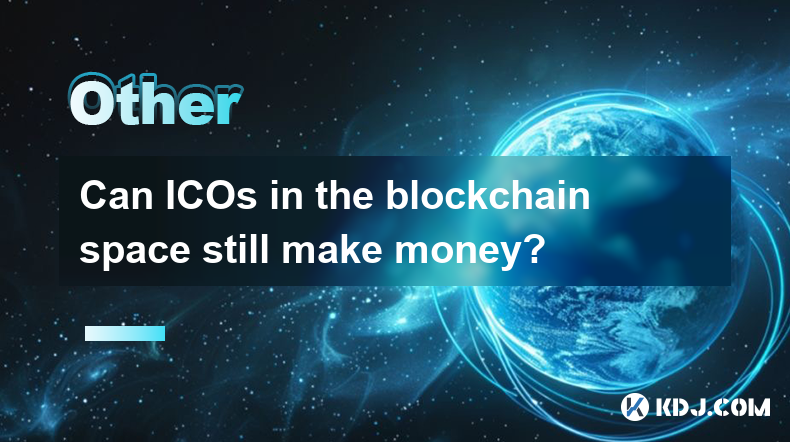
Can ICOs in the blockchain space still make money?
Apr 17,2025 at 08:29pm
The landscape of Initial Coin Offerings (ICOs) in the blockchain space has evolved significantly since their peak in 2017 and 2018. Despite the increased regulatory scrutiny and the rise of alternative fundraising methods like Security Token Offerings (STOs) and Initial Exchange Offerings (IEOs), ICOs can still be a viable way to raise funds and generat...
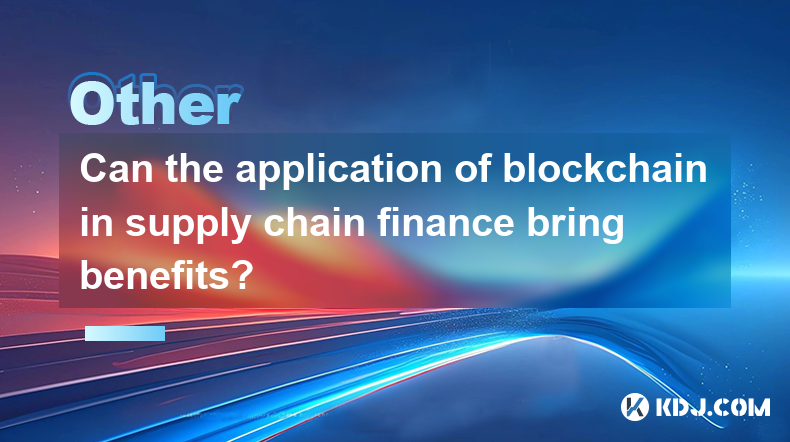
Can the application of blockchain in supply chain finance bring benefits?
Apr 15,2025 at 04:00pm
Can the application of blockchain in supply chain finance bring benefits? The integration of blockchain technology into supply chain finance has garnered significant attention in the cryptocurrency and financial sectors. This article explores how blockchain can potentially revolutionize supply chain finance, detailing its benefits and providing a compre...

Does the ranking of Chinese blockchain apps include cross-chain applications?
Apr 14,2025 at 04:00pm
The ranking of Chinese blockchain apps is a comprehensive evaluation that takes into account various aspects such as user base, transaction volume, and technological innovation. A pertinent question arises regarding whether these rankings include cross-chain applications. Cross-chain applications, which allow different blockchain networks to interact an...
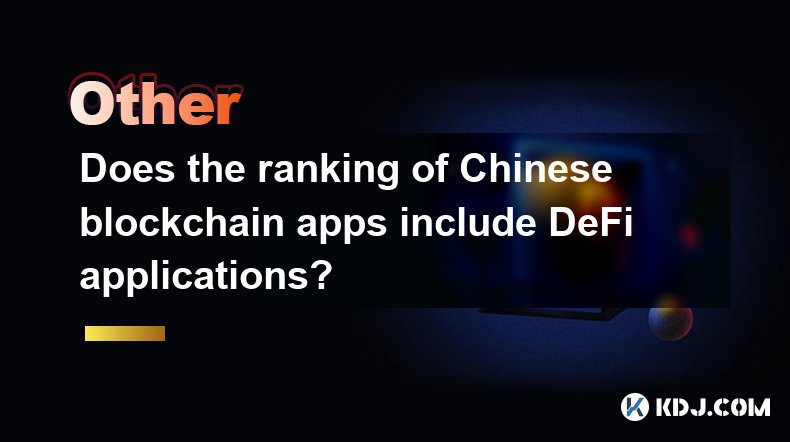
Does the ranking of Chinese blockchain apps include DeFi applications?
Apr 15,2025 at 06:57am
The ranking of Chinese blockchain apps is a comprehensive list that showcases the most popular and influential applications within the cryptocurrency ecosystem. One question that often arises is whether these rankings include DeFi applications. To answer this, we need to delve into the specifics of how these rankings are compiled and what types of appli...
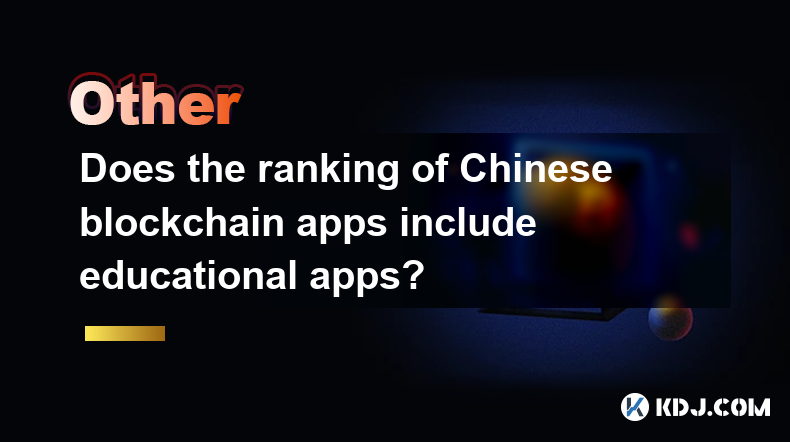
Does the ranking of Chinese blockchain apps include educational apps?
Apr 16,2025 at 03:35am
The ranking of Chinese blockchain apps often includes a variety of categories, from finance and gaming to social networking and beyond. One question that frequently arises is whether these rankings include educational apps. To address this, we need to delve into the specifics of how blockchain apps are categorized and ranked in China, and whether educat...
Does the ranking of Chinese blockchain apps include enterprise-level applications?
Apr 15,2025 at 06:42am
The ranking of Chinese blockchain apps often includes a variety of applications, ranging from consumer-focused to enterprise-level solutions. Understanding the scope and criteria for these rankings is essential to determine if enterprise-level applications are included. This article delves into the specifics of how Chinese blockchain app rankings are co...

Can ICOs in the blockchain space still make money?
Apr 17,2025 at 08:29pm
The landscape of Initial Coin Offerings (ICOs) in the blockchain space has evolved significantly since their peak in 2017 and 2018. Despite the increased regulatory scrutiny and the rise of alternative fundraising methods like Security Token Offerings (STOs) and Initial Exchange Offerings (IEOs), ICOs can still be a viable way to raise funds and generat...

Can the application of blockchain in supply chain finance bring benefits?
Apr 15,2025 at 04:00pm
Can the application of blockchain in supply chain finance bring benefits? The integration of blockchain technology into supply chain finance has garnered significant attention in the cryptocurrency and financial sectors. This article explores how blockchain can potentially revolutionize supply chain finance, detailing its benefits and providing a compre...

Does the ranking of Chinese blockchain apps include cross-chain applications?
Apr 14,2025 at 04:00pm
The ranking of Chinese blockchain apps is a comprehensive evaluation that takes into account various aspects such as user base, transaction volume, and technological innovation. A pertinent question arises regarding whether these rankings include cross-chain applications. Cross-chain applications, which allow different blockchain networks to interact an...

Does the ranking of Chinese blockchain apps include DeFi applications?
Apr 15,2025 at 06:57am
The ranking of Chinese blockchain apps is a comprehensive list that showcases the most popular and influential applications within the cryptocurrency ecosystem. One question that often arises is whether these rankings include DeFi applications. To answer this, we need to delve into the specifics of how these rankings are compiled and what types of appli...

Does the ranking of Chinese blockchain apps include educational apps?
Apr 16,2025 at 03:35am
The ranking of Chinese blockchain apps often includes a variety of categories, from finance and gaming to social networking and beyond. One question that frequently arises is whether these rankings include educational apps. To address this, we need to delve into the specifics of how blockchain apps are categorized and ranked in China, and whether educat...

Does the ranking of Chinese blockchain apps include enterprise-level applications?
Apr 15,2025 at 06:42am
The ranking of Chinese blockchain apps often includes a variety of applications, ranging from consumer-focused to enterprise-level solutions. Understanding the scope and criteria for these rankings is essential to determine if enterprise-level applications are included. This article delves into the specifics of how Chinese blockchain app rankings are co...
See all articles























































































